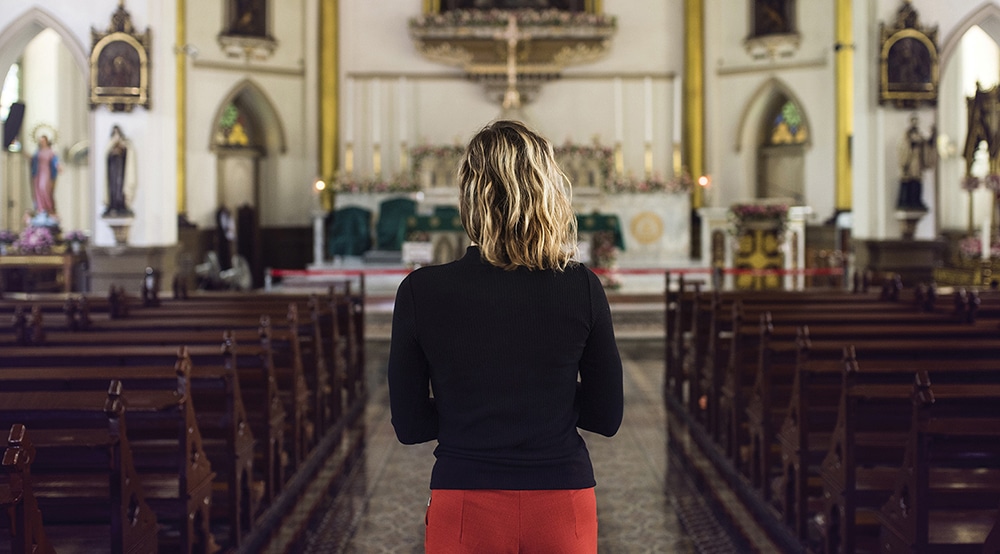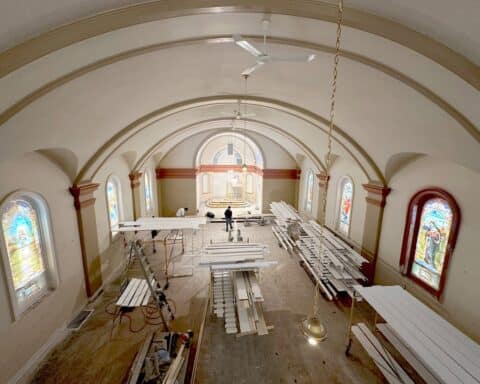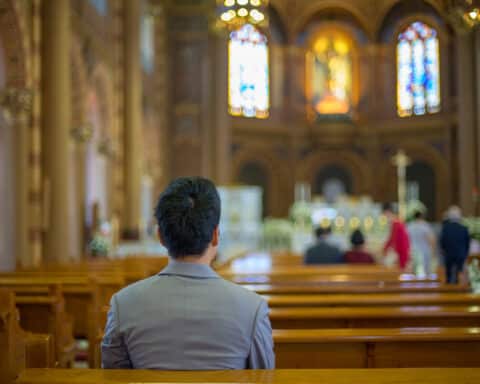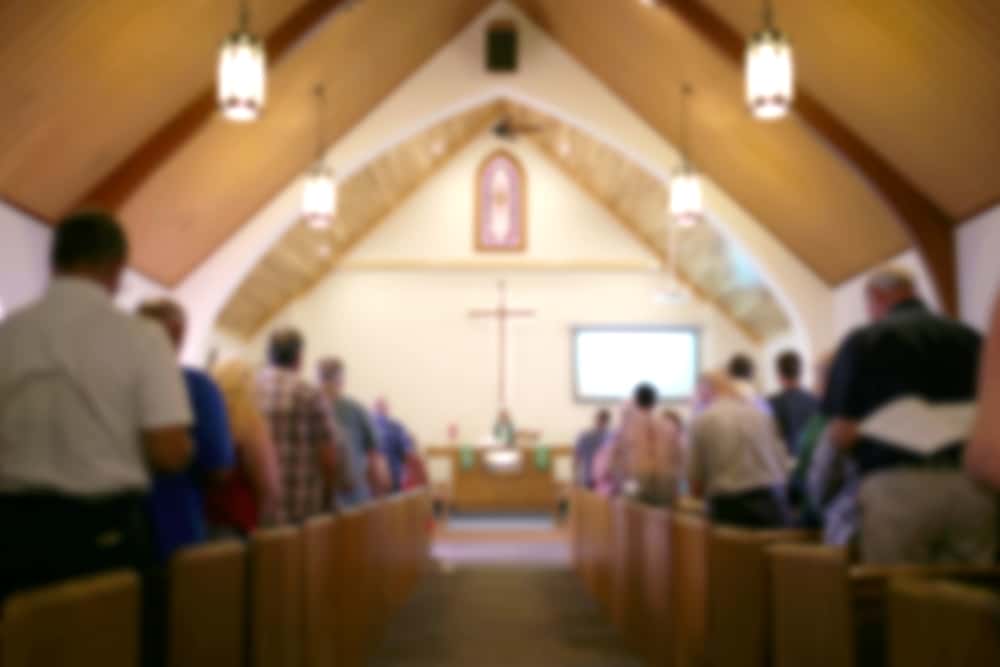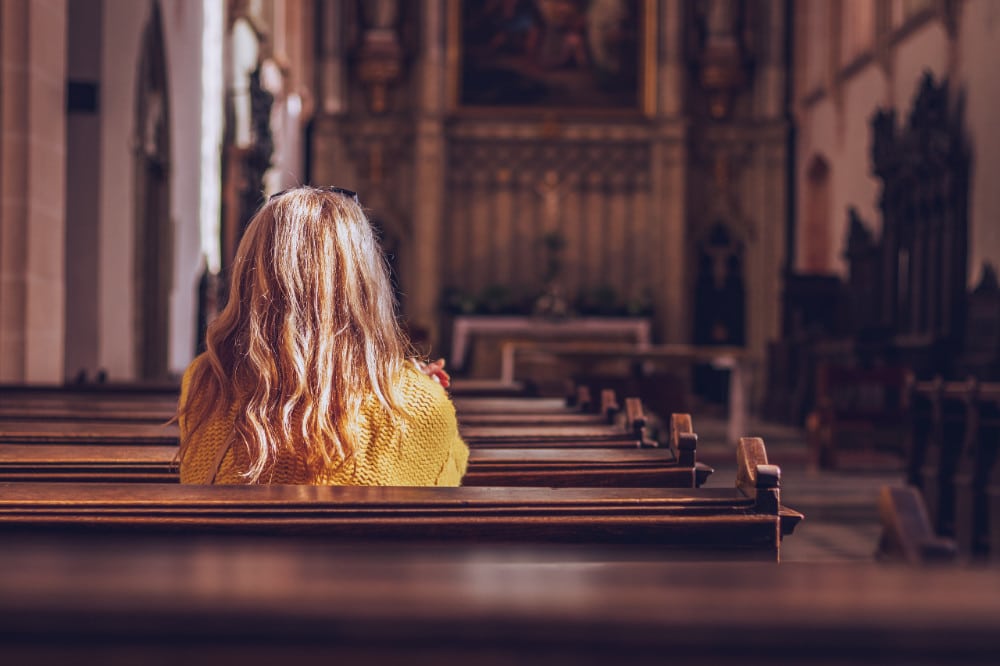Not many Catholics know this, but your real parish is the one whose territory includes your place of residence.
At least that is how the Code of Canon Law still sees it. But even with that built-in understanding of one’s territorial parish, canon law does not require you to register or attend Mass at the parish that is nearest to your home.
“Lay Catholics, a lot of pastors too, think that you register in a parish and that you become a parishioner by signing up and registering with the parish. … But strictly speaking, that’s not how the Code of Canon Law treats it,” said Msgr. Jason Gray, a canon lawyer and a priest of the Diocese of Peoria, Illinois.
“There is nothing that prohibits people from attending Mass wherever they wish to go. … Any Catholic can go to any Catholic church, satisfy their Sunday obligation, and the code really has nothing to say about that,” Msgr. Gray told Our Sunday Visitor.
That conflicting situation reflects a reality in the modern world. People today are much more mobile than what were earlier generations of Catholics. They can drive to parishes many miles away. Unlike their predecessors, Church leaders today would be hard-pressed to require Catholics to only attend Mass at their local parishes.
There are almost as many reasons why people register and attend Mass at other parishes as there are practicing Catholics. Some like the liturgy or preaching at one parish, while others look for a parish that has a school or a certain ministry. Many also look for a new parish when a different pastor comes in and starts changing things.
This has been the reality of Catholic life in the United States for several decades. Most Catholic bishops and priests do not complain, because they arguably are happy that people who go to a different parish are at least still attending Mass and choosing to be involved in the life of the Church.
However, some observers raise questions if this kind of “free agency” in parish affiliation is somehow exacerbating polarization in the Catholic community. They speak of a danger of Catholics segregating themselves into parishes that reflect their own ideological views. In some dioceses, Catholics speak of belonging to the “traditional parish” or the “social justice parish.”
“There is a level of spiritual self-care that every Christian has to take care of,” said Kevin Ahern, a religious studies professor at Manhattan College in New York City. “But the real danger is if it leads to a type of ecclesial sort, where in parishes or specific Masses, everyone votes the same, everyone looks the same and everyone has the same tax bracket. There is a real problem with that.”
“I don’t know how we address that,” Ahern told OSV. “But I think it’s something that needs a lot of time and effort to address.”
Meeting spiritual needs
While some are concerned that what they call “parish hopping” reflects modern American consumerist tendencies, others note that Catholics have a right to have their spiritual needs met, whether or not their local parishes are up to the task.
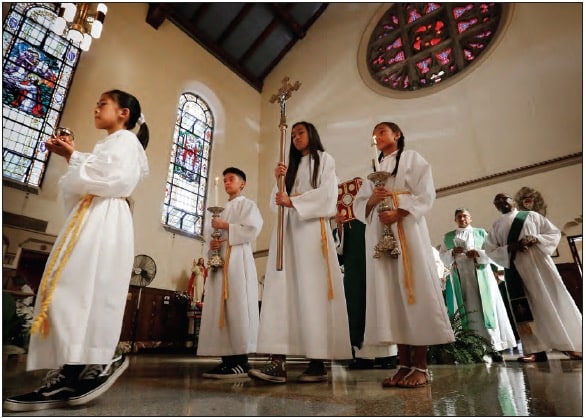
“Truthfully, I think in general pastors and bishops recognize the importance of allowing people to belong to whatever parish helps their faith,” said Franciscan Sister Katarina Schuth, a professor of the social scientific study of religion at the University of St. Thomas in St. Paul, Minnesota.
Sister Schuth, who has given presentations on the topic throughout the country, told OSV that in previous centuries, bishops could require Catholics to only attend Mass in their neighborhood parishes given the difficulty of travel in the days before automobiles and mass transit.
“Of course, the territorial parish then was their only choice,” said Sister Schuth, who added that the territorial parish had some built-in advantages that included worshipping with one’s neighbors and belonging to a cohesive community that knew when one of its own needed help.
Today, parishes are seen less as local communities and more as locations where Catholics can have their faith nourished.
“Oftentimes, it comes down to personal preference. Maybe it has to do with style. Maybe it has to do with where they feel comfortable. There can be many reasons that people might have for preferring one parish to another,” Msgr. Gray said.
“Some people may go to a parish because they got involved in a ministry and that ministry is particularly strong in this one parish, so they gravitate there,” Msgr. Gray added. “Other times, the new parish might just be where their friends go.”
Church law for decades, Msgr. Gray noted, has defined a Catholic’s parish as the one assigned to their territory, with the exception of personal parishes that are established for specific communities of people along differences of linguistic, ethnic and religious rite backgrounds.
“Before transportation was readily available, you went to your local parish because that’s what was convenient,” Msgr. Gray said. “To go to another place would be so far away. I don’t think you had much of a choice.”
With the exception of personal parishes, the 1983 Code of Canon Law — specifically in Canon 518 — says a parish is to be territorial, and embrace all of the faithful within a given territory. With that understanding come certain rights and responsibilities. A Catholic has the absolute canonical right, for example, to receive the sacraments in their territorial parish.
|
“As a general rule, a parish is to be territorial, that is, it is to embrace all Christ’s faithful of a given territory. Where it is useful however, personal parishes are to be established, determined by reason of the rite, language or nationality of the faithful of a certain territory, or on some other basis.”
— Canon 518
|
“If you want to get married, have a child baptized or a relative buried, the territorial parish is where you have the right to do that,” Msgr. Gray said.
The canonical understanding of the territorial parish also creates obligations for the local pastor. Regardless of whether or not the faithful in his territory are officially registered in his parish, the pastor has a canonical duty when called upon to provide them with spiritual care.
“If I live in Town A and am registered at a parish in Town B, when I’m sick or if I’m in a nursing home, it’s the pastor of the parish in Town A who has the responsibility of seeing to my needs as a Catholic,” said Msgr. Gray, who added that he has some shut-ins who live more than 20 miles away from the parish where he is currently assigned.
“Sometimes it’s not just practical for me to go out there,” he said. “I do what I can, but sometimes, it’s not possible, so who’s going to take care of them? The pastor of the parish where they are living. That’s the person who inherits the obligation.”
Adjusting to a mobile society
Canon law may establish the canonical definition of a parish and the corresponding canonical obligations and rights, but there is another set of expectations and principles that make it virtually impossible for a bishop, if he was so inclined, to enforce Mass attendance in the territorial parishes.
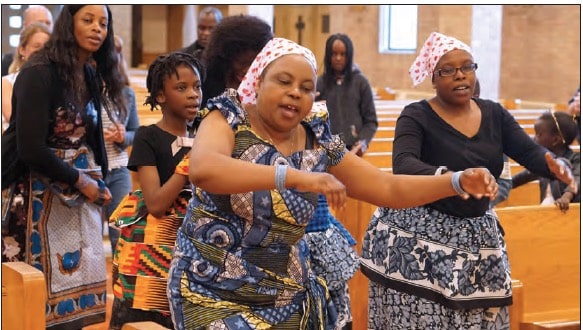
Canons 213 and 214 underscore that the Christian faithful have the right to receive an authentic Catholic liturgy and develop their own spiritual lives. The 1983 Code of Canon Law incorporates principles from the Second Vatican Council’s Decree on the Apostolate of the Laity and the Declaration on Religious Freedom, which declare that Catholics have the right of association within the Church.
“The current Code of Canon Law allows Catholics to satisfy their Mass attendance obligations regardless of where that Mass is celebrated,” said Edward Peters, a canon law professor at Sacred Heart Major Seminary in Detroit.
Peters, who writes about canon law in his blog, “In the Light of the Law,” told OSV that the former code essentially took the same approach.
“But some quirks in phrasing that older law, and lingering memories of when the place of celebration mattered in regard to satisfying one’s Mass obligation, left some people wondering whether they could attend Mass in other parishes and ‘have it count,'” Peters said. “The answer today is clearly yes, it counts.”
Msgr. Gray said he believes that the Code of Canon Law might have to eventually move away from the understanding of the territorial parish, given the reality of how most Catholics live today.
“The thing that has created the breakdown here is that because society is so mobile, functionally, people can go wherever they want,” Msgr. Gray said. “They don’t think twice about driving 10 miles or more because they prefer another parish.”
Reasons for changing parishes
With the freedom to attend Mass wherever they want recognized in canon law, Catholics in the 21st century often take advantage of being able to attend parishes in other neighborhoods or towns where they can find spiritual nourishment and a sense of belonging.
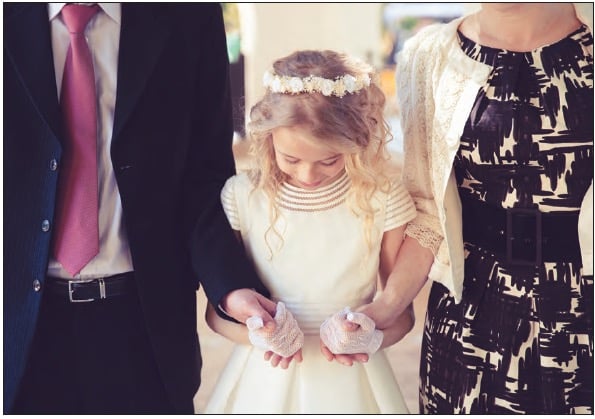
“We’re so much happier where we are now,” said Anthony David Hardesty, a resident of Rockport, Indiana, who attends Mass in a Catholic parish across the Ohio River in Owensboro, Kentucky.
Hardesty told OSV that he struggled with the decision to leave his territorial parish, where he had been active for many years, but decided to make the move after a former pastor began aggressively pushing parishioners to enroll in a financial literacy program, even writing in the parish bulletin that he expected 100% participation from the faithful.
“That was not only bullying but very unrealistic,” said Hardesty, who added that the pastor made him and his wife feel very uncomfortable in their own parish. Hardesty said he experienced a bit of “Catholic guilt” when he and his wife left the parish.
“But basically, I think we made the right decision,” he said.
Unfortunately, personality conflicts with pastors seem to be a common factor in pushing Catholics away from their parishes. Andy Simmons, a Benedictine oblate who lives in Seattle, told OSV that he left a parish about a year ago where he had led a Bible study and his wife began a women’s ministry program.
“We were very rooted in this place,” said Simmons, who added that a religious order priest became the pastor and turned parish life upside down, firing the parish organist as she was leaving on vacation, weakening the social justice ministry and ignoring input from longtime parishioners.
Simmons said it “was incredibly difficult” to leave the parish, especially since his youngest son had been baptized there, but said he is finding a spiritual home in his new parish, where his youngest son is involved in the youth group and where Simmons is helping out with the RCIA program.
“At least I’m no longer angry all the time,” Simmons said. “That’s no way to go Mass.”
Tragically, the clergy sex abuse crisis has also caused Catholics who have not left the Church altogether to find refuge in other parishes. A woman who lives in the Diocese of Arlington, Virginia, who asked that her name not be printed, told OSV that she no longer attends diocesan parishes after a priest sexually assaulted her when she was in her early 30s.
“Even with the priest removed from the diocese, which he was, the location became unbearable for me,” said the woman, who attends Mass at parishes run by religious orders. “I’ve been inside [her former parish] a couple of times in 15 years, never for Mass, and it makes me feel physically ill.”
Spiritual nourishment
Faithful priests know quite well that many of the Catholics in their pews may someday leave for greener pastures, or that they have come from parishes in other neighborhoods and towns.
“When I look out in the church, there are a good number of people who do not belong to my parish, but for whatever reason, that Mass works for them,” said Father Jay Mello, the pastor of two parishes in Fall River, Massachusetts: St. Michael Church, a personal parish for Portuguese Catholics, and St. Joseph Church, a territorial parish.
In an ideal world, Father Mello told OSV that every parish would have a saintly pastor who gets along with everyone and has the support of his flock. But the reality is often quite different.
“If you’re not being spiritually nourished, then you have to go somewhere else,” Father Mello said. “I think you almost have a spiritual obligation to go somewhere else.”
|
“If you’re not being spiritually nourished, then you have to go somewhere else. I think you almost have a spiritual obligation to go somewhere else.”
— Father Jay Mello |
In addition to personality clashes with pastors, Father Mello noted that there are several other factors that cause Catholics to attend Mass at other parishes, such as Mass times that conflict with other Sunday obligations
“There are very well-intentioned people who make the decision to go to a Mass that is not at their parish, but there are certainly those who shop around,” said Father Mello, who added that parish consolidations, mergers and clustering — where several parishes operate in conjunction with one another — have also displaced some longtime parishioners.
“People in a parish cluster are going to Masses that they can make, which may not be offered in their own parishes,” Father Mello said. “Oftentimes, pastoral planning in dioceses such as ours forces the question of where people are going to attend Mass.”
Addressing polarization
Father John Hollowell, the pastor of Annunciation Church in Brazil, Indiana, and St. Paul Church in nearby Greencastle, told OSV that he sees a consumerist dimension when people move to parishes that align with their own ecclesial views and tastes. He speculated that if bishops made it a point to make the liturgy and parish life more uniform across the board, there wouldn’t be the kind of stark differences between parishes in the same diocese.
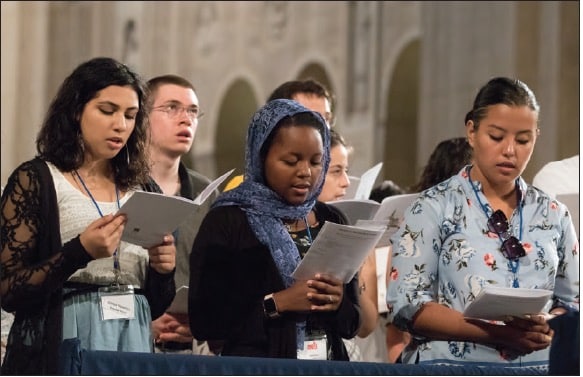
Archdiocese of Washington
“As long as [the differences] are allowed, you’re not going to get away from that swing, with all the different personality-driven Masses,” said Father Hollowell, who also sees several advantages to Catholics attending Mass in their own territorial parishes.
“I see it along the lines of what you see in the Acts of the Apostles, where there was a real intentional community of people. … So I’m a huge proponent of it,” said Father Hollowell, who emphasized the cohesiveness of belonging to the same parish where your literal neighbors attend.
“I think the advantage [is] that you’re worshiping with a regular community of people, the people who know you, who you see week in and week out, who can care for you and you can care for them, where if someone is missing, someone asks where they are and how they’re doing,” Father Hollowell said.
Territorial parishes comprised solely of Catholics from the same geographical area could, at least theoretically, address the problem of polarization by having Catholics from different walks of life and with conflicting worldviews sitting next to each other and worshipping God together.
But making the case that canon law should be changed to make it more difficult to attend Mass outside the territorial parish is a tough one to make, especially when several studies indicate that less than 4 in 10 Catholics regularly attend Mass.
“We need to challenge people, which I don’t think is our first instinct, given that so few people are going to Mass every Sunday,” Father Hollowell said. “But I think priests and bishops need to do that more, for the good of their communities.”
| Registering at a parish |
|---|
|
Some may ask, what is the point of registering in a parish?
A Catholic can attend Mass anywhere and may even go to the same parish every weekend. But registering in the parish brings a sense of belonging and identity in the parish community. It gives a Catholic a stake in the parish, and is a sign of commitment that they will practice their faith. Registering in the parish also gives the pastor and staff the opportunity to get to know the flock and their spiritual needs and to share information with them. Besides receiving year-end statements of donations for income tax purposes, parish registration carries with it other benefits. Registered active parishioners can more easily be validated to be sponsors and godparents, and they can enroll their children in religious education programs. Accurate registration information also assists the parish when census data helps a bishop to determine how many priests to assign there, as well as how many Masses, ministries and faith enrichment programs will be offered. |
What about the young adults?
Young adults — ages 18 to mid 30s — may be the most mobile demographic in terms of parish registrations in American Catholic life.
They are frequently changing jobs, zip codes and apartments within the same city. Being in such a transitional state of life means that young adult Catholics are also often moving around to different parishes, whether or not they actually register with them.
Kevin Ahern, a religious studies professor at Manhattan College in New York City, mentioned another dynamic.
“Young people coming out of strong campus ministry programs, if they go to their local geographic parish, they often might not find it as engaging as their campus ministry was,” Ahern said.
A ministry leader who organized liturgies and ministries at the campus Newman Center may also find themselves not welcomed to be in a leadership position if they try to get more involved in their local parish soon after graduating.
“So I think a lot of people like that will gravitate to parishes that are more openly engaging of young adults and young professionals,” Ahern said.
Even young adults who have settled down, gotten married and have kids, can have difficulty fitting in to their geographical parish if there are not many other young families.
“In that case, the parish maybe doesn’t engage you, so you might want to go to another place,” Ahern said.
Sister Scuth, the professor at the University of St. Thomas, told OSV that traditional concepts of community often appeal to millenials and young adults, who she said tend to be rooted in their local communities.
Sister Scuth said millenials are often “cultural” Catholics who identify with the parish as a place of peace where they belong. They crave authentic communities with a shared purpose around service.
“I think a lot of people like that will gravitate to parishes that are more openly engaging of young professionals and young people,” said Ahern.
Ahern said young adults in general don’t have the same loyalty to a territorial parish as previous generations of Catholics. That poses various challenges, especially to the spirituality of communion that Ahern said is central to the liturgy itself.
“The danger is you risk turning the liturgy into something that’s consumeristic and not something that’s participatory, life-giving and centered on the Eucharist and the word of God,” Ahern said. “You turn it into something that’s a commodity. How do we move past that?”
‘Diverse Body of Christ’
Father Mello of Fall River emphasized that the Mass is there “first and foremost” for people to worship God and strengthen their relationship with Christ.
“If more people were concerned about keeping their pastors accountable to doing things liturgically correct, then I don’t think we would see people changing parishes as much,” Father Mello said. “I think the bigger concern is not, are we creating ecclesial enclaves, but are our priests being faithful to what the Church asks of us?”
While those questions remain to be answered, Catholics such as Mätt Lintzenich, who lives in Lake Katrine, New York, will continue to attend parishes where they feel welcome. Lintzenich, who is single, said he attends Mass at several different parishes throughout the Hudson Valley.
“I’m always going on adventures, and thinking to myself, ‘Let’s check this church out. I’ve never been there before,” said Lintzenich, who attends Masses in parishes ranging in description from conservative to charismatic.
“Basically I’m getting a different experience no matter where I go,” he said. “Each community is different, with a different sort of culture that comes with the town and the people who are there. Some towns are more conservative, some are more liberal. You just meet a wide variety of people.”
Lintzenich said he has met “wonderful priests” and lay Catholics from all walks of life in those communities, even including charismatic Catholics who attend the Latin Mass.
“I just see it all as part of the diverse Body of Christ,” Lintzenich said. “To me, that’s part of what makes the Church beautiful. It’s so diverse.”
Brian Fraga is a contributing editor for Our Sunday Visitor.
| Leaving because of a pastor |
|---|
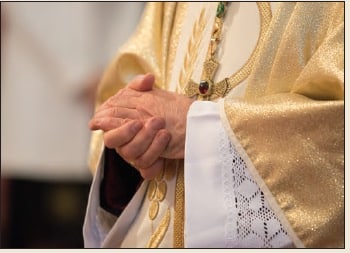 Kelly Menino and Megan Borges Beleda found a spiritual home at St. John of God Church in Somerset, Massachusetts. Both registered at that suburban parish after leaving urban parishes that they had long attended in nearby Fall River. “I love it,” said Beleda, who moved to her new parish a year ago after having attended her previous urban parish virtually her entire life. She told OSV that she did not “click” with her previous pastor, and that she found the core group of volunteers in that parish not very welcoming to people who were not in their own tight circle of friends and family. “Here, I feel very welcome, no question. Everybody I’ve met is friendly,” Beleda said. Menino also began attending St. John of God Church about a year ago. She left her former parish in Fall River when a new pastor arrived and began changing things, including cutting back some ministries and offering the Latin Mass, which Menino said went against what had been a “pretty charismatic” parish community. “When a pastor changes, you expect some things to change, but to put a priest in who has a completely different charism than the rest of the parish, it doesn’t work. It just drives people away to find other parishes,” Menino said. Beleda said her new church’s pastor, who will soon be leaving, encouraged her to get involved in parish life, which reinvigorated her own faith life. “He got me back in to helping out, and through that I’ve met quite a few people who welcomed me,” Beleda said. As for Menino, the fact that the pastor is leaving has her considering moving parishes again. “I want a parish that seems more stable,” she said. “I want to go to a parish where I know the priest, where there is a good community, but I feel that with all these mergers going on, you almost cannot find that anywhere.” |

